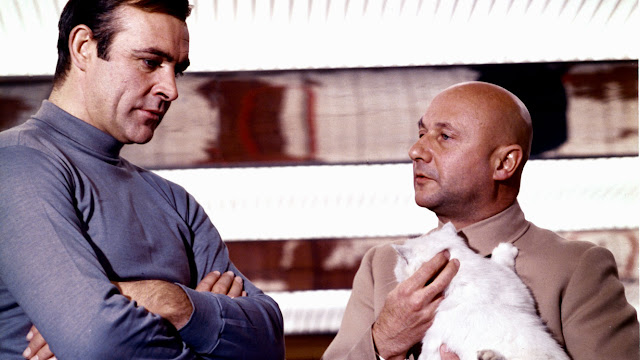With 007's most notorious villainous organisation set to make its return in Spectre later this year, and the James Bond franchise celebrating fifty years in cinema with its last installment Skyfall, Ben has taken the opportunity to take in every Eon Productions Bond film in order, from the series' beginnings in 1962 to the present day. Now pay attention...
 |
| 'You Only Live Twice stands tall as the first and perhaps best example of how to get the Bond balance just right'. |
In Thunderball and You Only Live Twice, the fourth and fifth instalments in the James Bond series, we essentially get two attempts at what might now be considered the archetypal Bond film. Whilst the first three entries in the franchise all feel quite distinct not only in narrative structure but also arguably in tone and execution, this is arguably the pair of films where the franchise is first seen to truly establish the "Bond formula" in a number of respects.
Thunderball starts well enough, returning the focus to SPECTRE after Goldfinger and presenting its own potentially iconic adversary in the criminal organisation's "Number Two" Emilio Largo (Adolfo Celi). After further establishing the lighter tone through an opening sequence involving a fight with a villain disguised as his own widow and Bond (Sean Connery) utilising a jet pack to make his getaway - a gadget that disappointingly doesn't reappear later in the film - returning director Terence Young initially missteps by spending too long on Bond's stay at a health clinic. Thankfully, SPECTRE's theft of two nuclear warheads to hold the world to ransom that follows this offers a strong first act premise from which a compelling narrative might unfold.
The problem is that Thunderball never quite realises this potential. The action within the first hour is meagre, with Young's slow-burning direction that worked so well in Dr. No and From Russia With Love making matters feel decidedly sluggish here. Largo never comes into his own, becoming less effective and less memorable as the film wears on. The ransom plot gets lost amongst Young's preoccupation with underwater action scenes which, whilst certainly innovative and unique, slow the film's pace considerably and aren't nearly as interesting as the director thinks. Despite containing many of the elements that would become staples of the series, Thunderball ultimately ends up just as much as an exercise in how to mishandle these elements as it does in making them work.
In contrast, You Only Live Twice stands tall as the first and perhaps best example of how to get the Bond balance just right. An entry in the series that it has become fashionable to deride in recent years, with many picking out a handful of the more dated elements to judge the entire film by, You Only Live Twice must also now contend with being the film which is most often plundered when pastiching Bond films and their ilk, most recognisably in the Austin Powers franchise. Taken on its own merits and as a product of the time in which it was made, however, the fifth Bond film is pretty hard to fault.
The screenplay from the endlessly creative Roald Dahl is one of the sharpest the series has to offer, utilising the Space Race superbly at exactly the right time from the chilling opening scene onwards. Despite his particularly cringeworthy opening line ("Why do Chinese girls taste different from all other girls?"), Bond himself is arguably more compelling here than ever, Connery shifting from one brilliant espionage sequence to the next without missing a beat. The action set piece in which Bond dogfights against several enemy helicopters in "Little Nellie", Q Branch's souped-up autogyro, is brilliantly shot, superbly entertaining and a perfect Bond sequence. The cinematography is also consistently impressive: extreme long shots during a fight sequence at a dockyard are especially striking; and the way in which the Japanese setting is captured and utilised throughout regularly makes You Only Live Twice a real joy to look at.
Through the long-teased revelation of SPECTRE's "Number One", Ernst Stavro Blofeld (Donald Pleasance), in his film's final act, director Lewis Gilbert feels as though he finally delivers the early promises made four films earlier in Dr. No. Everything from the hi-tech volcano base, to the army of Japanese secret service ninjas facing off against SPECTRE's swarm of henchmen, to Pleasance's iconic creepy and calculating portrayal of Blofeld himself, so much of You Only Live Twice is not only brilliantly entertaining, but would also go on to define what is loved about the Bond franchise for years into the future. If Thunderball's legacy is to identify many of the potential pitfalls when using the Bond formula, then You Only Live Twice is a lasting reminder of just how good it can be when it works.
If Sean Connery had had his way, his fourth and fifth Bond films would have been his last. Had that been the case, then his tenure as the first big screen 007 would have resulted in a quintet of solid action spy movies that on the whole set an admirably high bar for the series. The fact that Connery would in fact return to the role following his departure after You Only Live Twice is a discussion for another article; but had the actor called it a day at five as he originally intended, it's interesting to consider whether or not his overall time as Bond might hypothetically be viewed differently.
| Thunderball |
| You Only Live Twice |
By Ben Broadribb. Ben is a regular contributor to Film Intel, having previously written at Some Like It Hot Fuzz. He is normally seen in the wild wearing t-shirts containing obscure film references. He is a geek, often unashamedly so. He's also on Google+ and Twitter.


No comments:
Post a Comment